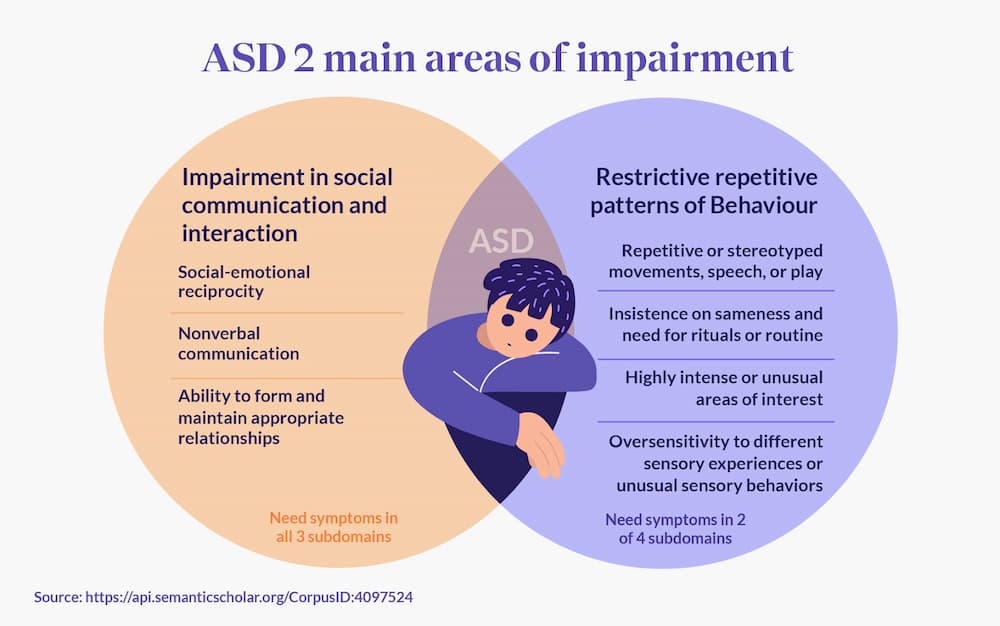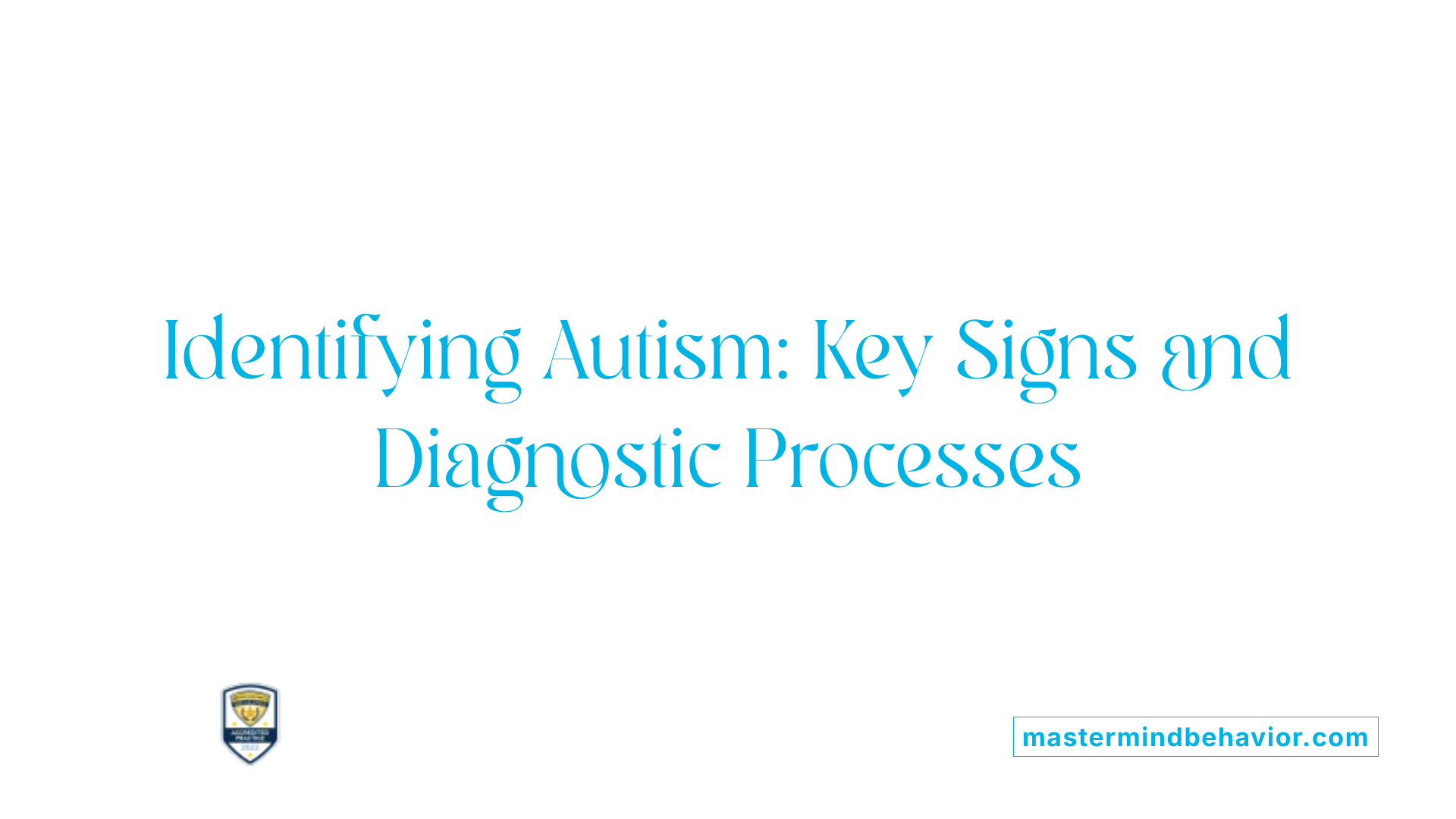Unique abilities often seen by an experienced Autism Therapist
Unique abilities often seen by an experienced Autism Therapist
Blog Article
Secret Signs and Signs to Recognize in Individuals With Behavioral Autism
When you experience somebody with behavioral autism, recognizing vital indications and signs is necessary. You could observe challenges in social interactions and communication, as well as a strong need for routines. Additionally, sensory sensitivities can lead to frustrating experiences. Recognizing these traits can boost your support and interventions, yet there's even more to discover about just how these actions show up in daily situations. Allow's discover what these indicators truly look like.
Obstacles in Social Communications
When you engage with somebody on the autism range, you might observe they deal with social hints and interaction. These difficulties can make social interactions feel frustrating for them. You may see them staying clear of eye call or standing too close or also much away during discussions, which can produce misconceptions. They may not notice body language or face expressions, making it harder for them to gauge just how others are feeling.
Furthermore, you may discover that they choose routines and acquainted setups, which can limit their readiness to involve in new social situations. They could chat about their rate of interests in terrific information without seeing if you're interested when they do engage. This can result in discriminatory conversations that leave you feeling detached. Recognizing these challenges can assist you come close to communications with compassion and patience, cultivating an extra comfortable atmosphere for both of you.
Trouble With Verbal and Non-Verbal Communication

Non-verbal interaction can be a lot more difficult. You may see a lack of eye get in touch with or limited use gestures, which can make interactions really feel awkward. Face expressions may not always align with the discussion, resulting in complication regarding their feelings. Identifying these signs is crucial, as it assists you far better support and involve with individuals on the autism range. By understanding their communication difficulties, you can foster much more purposeful connections and give a much more encouraging environment.
Repetitive Habits and Routines
Communication difficulties often go along with other indicators of autism, such as recurring behaviors and a strong preference for routines. You may see that people with autism frequently participate in particular, repeated activities, like hand-flapping, shaking, or duplicating expressions. These behaviors can supply convenience and a feeling of control in an often frustrating world.
Regimens are equally crucial; many people prosper when they follow an organized routine. You might discover that modifications to these routines can result in substantial distress. For instance, if they have a day-to-day routine of consuming breakfast at a specific time or following a certain route to college, any kind of interruption can trigger stress and anxiety.
Acknowledging these patterns aids you recognize their habits and provide assistance. By accommodating their need for regular and enabling repetitive actions, you can create an extra comfortable environment that reduces their obstacles.
Sensory Level Of Sensitivities

Usual Sensory Triggers
Sensory sensitivities can substantially impact day-to-day life for individuals with autism, as particular stimuli usually set off frustrating reactions. Usual sensory triggers include loud noises, intense lights, and solid scents. You may see that sudden noises, like alarms or alarms, cause stress and anxiety or distress. In a similar way, fluorescent illumination in stores can really feel extreme and uncomfortable. Structures can additionally play a considerable function; harsh fabrics or specific food structures might be excruciating for you. Additionally, crowded areas can bewilder your detects, making it hard to focus or relax. Recognizing these triggers can help you manage your environment much better. By knowing what influences you, you can take actions to minimize discomfort and boost your everyday experiences.
Behavior Feedbacks Clarified
Recognizing your behavioral actions to sensory sensitivities is necessary, as they usually expose exactly how you communicate with the world. You could observe that certain audios, lights, or appearances overwhelm you, leading to anxiousness or discomfort. When confronted with these stimulations, you may withdraw, cover your ears, and even respond strongly. These reactions aren't just peculiarities; they're your way of handling overstimulation. You might likewise find on your own seeking specific sensory experiences, like deep pressure or silent atmospheres, to help ground on your own. Recognizing these patterns helps you understand your demands better and can lead exactly how you connect them to others. By acknowledging your sensory sensitivities, you can function towards producing an environment that feels more comfy and manageable for you.
Coping Strategies Review
Acknowledging your sensory level of sensitivities is simply the primary step; now it's time to check out coping methods that can aid you manage those experiences successfully. Start by producing a sensory toolkit tailored to your requirements. This can consist of noise-canceling headphones, fidget playthings, or relaxing aromas. Developing a structured regimen can additionally offer predictability, minimizing anxiousness around sensory overload. Take breaks in a quiet space to regroup when you feel overloaded. Exercising mindfulness strategies such as deep breathing can assist ground you in the minute. In addition, connect your demands with those around you; having encouraging find here loved ones can make a significant distinction. Keep in mind, discovering what works ideal for you might take time, so be patient and open to attempting new techniques.
Limited Rate Of Interests and Focus
While many people create a wide variety of rate of interests, those with autism typically demonstrate limited passions and an intense concentrate on details topics. You could observe that somebody with autism can invest hours diving into their favorite topic, whether it's a certain kind of train, a specific motion picture, or a clinical idea. This intense emphasis isn't just a leisure activity; it can become a main part of their identification and social interactions.
You might discover that conversations revolve around these rate of interests, and they may have a hard time to take part in wider subjects. For them, these focused passions provide convenience and a sense of mastery. While it's important to motivate expedition of new topics, appreciating their enthusiasms is equally essential. By comprehending and recognizing these restricted interests, you can cultivate a supportive atmosphere where they really feel valued and understood, enabling more meaningful connections and interactions.
Psychological Regulation Troubles
Individuals with autism frequently deal with difficulties in emotional policy, which can be influenced by their intense emphasis on details passions. You may observe that when an individual is deeply engaged in a favored task, they can experience strong emotions, whether exhilaration or stress. When points don't go as planned., this strength often makes it difficult for them to shift equipments or handle their feelings - Autism Spectrum Therapies.

Variability in Developing Turning Points
When it comes to developmental milestones, you'll notice that individuals with autism commonly show a vast variety of irregularity. You could see a youngster succeed in language skills yet battle with social interactions.
It's necessary to identify that each person's trip is one-of-a-kind. Some might establish intricate skills early, only to deal with obstacles in the future. Others may take longer to accomplish fundamental milestones however after that flourish in particular areas. Observing these patterns can aid you recognize their staminas and requires much better.
Frequently Asked Concerns
How Is Autism Diagnosed in Kid and Grownups?
To detect autism in grownups and kids, professionals assess behavior, communication abilities, and social communications. If a specific satisfies the requirements for autism range problem., go to this web-site they typically make use of standard tests, meetings, and observations to determine.
Exist Different Types of Autism Range Disorders?
Yes, there are different types of autism range problems, including Asperger's syndrome and prevalent developmental disorder-not otherwise defined. Each kind differs in seriousness and features, so recognizing these differences can aid you much better assistance people with autism.
What Therapies Are Reliable for Individuals With Autism?
When thinking about effective therapies for individuals with autism, you'll locate options like Applied Habits Evaluation, speech treatment, and work-related treatment. Each approach can assist enhance interaction, social abilities, and day-to-day functioning tailored to private requirements.
Can People With Autism Lead Independent Lives?
Yes, people with autism can lead independent lives. With the click here for info best support, skills training, and sources, you can assist them establish self-sufficiency, take care of daily tasks, and thrive in different settings, cultivating their freedom.
Exactly How Can Families Assistance Loved Ones With Autism?
You can sustain your loved ones with autism by creating a structured environment, urging their interests, practicing perseverance, promoting interaction, and promoting social skills. Commemorate their success, regardless of exactly how little, and develop an encouraging neighborhood.
Although lots of individuals on the autism spectrum can make use of and recognize language, they usually deal with significant challenges with both non-verbal and verbal interaction. Recognizing these indications is important, as it assists you far better support and engage with individuals on the autism range. You might notice that people with autism typically involve in particular, repetitive activities, like hand-flapping, rocking, or repeating phrases.Sensory level of sensitivities can significantly influence day-to-day life for individuals with autism, as certain stimulations commonly set off overwhelming reactions.When it comes to developing turning points, you'll see that people with autism typically reveal a vast array of variability.
Report this page